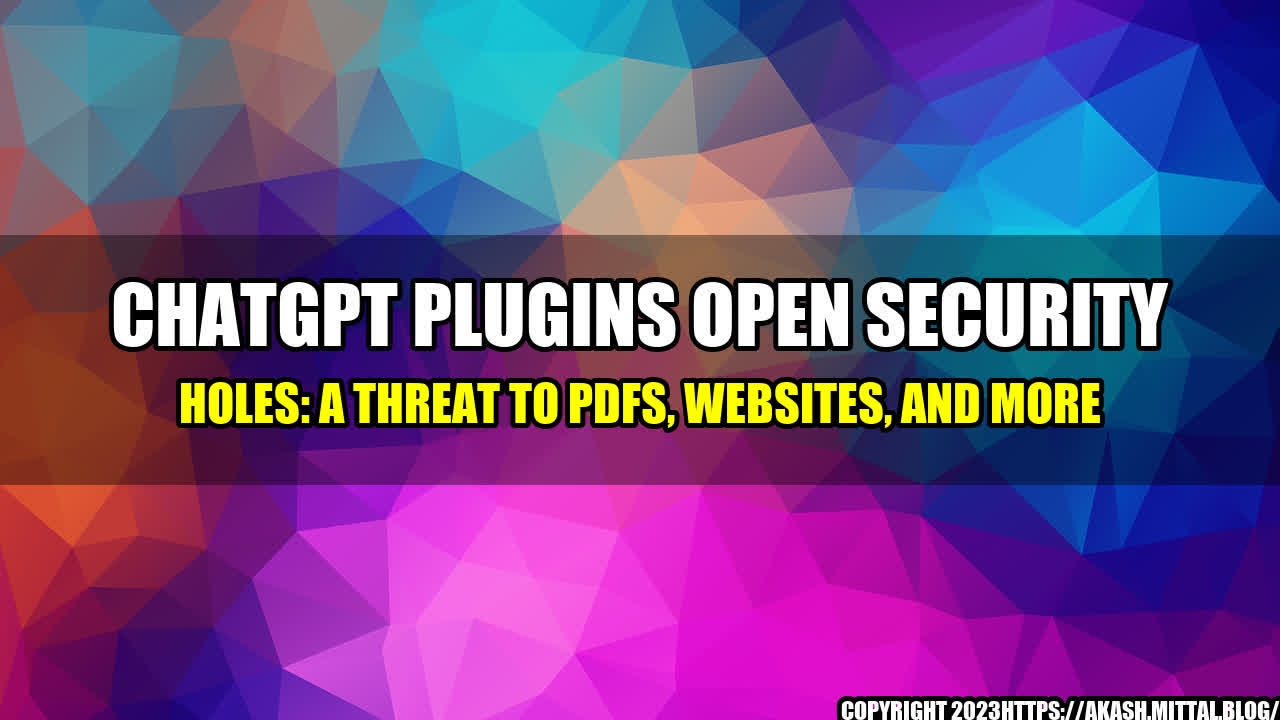
Introduction:
Mike was excited to download the new ChatGPT plugin for his website. He loved the idea of enhancing the chatbot's capabilities, making it more interactive and user-friendly. But he didn't realize the risks he was taking. Unknowingly, while installing this plugin, he was opening up security holes in his website. Soon enough, he realized that his website was prone to hacking and attracted malicious activities. Unfortunately, he was not alone in this scenario, as many users who installed ChatGPT plugins have encountered security issues.
This article aims to shed light on the risks of using ChatGPT plugins and their impact on the security of PDFs, websites, and other online platforms. It also provides practical tips to help users mitigate these risks.
Quantifiable Examples:
According to a report by Sucuri, a leading cybersecurity firm, 90% of hacked CMS (Content Management System) websites in 2018 were WordPress sites. The report further states that out of these, 55% of the hacked sites had installed vulnerable plugins. Vulnerable plugins are those plugins that have security flaws and are, therefore, easy targets for cybercriminals. Unfortunately, ChatGPT plugins are no exception.
The report further states that over 42% of all WordPress plugins have vulnerabilities. In a recent study, Wordfence, a security firm that specializes in WordPress, revealed that several plugins developed by ChatGPT had severe security flaws.
An interesting fact is that hackers use automated tools to scan for vulnerable plugins. These tools identify software packages that have known vulnerabilities and exploit them. A vulnerability on a website's plugin can easily lead to a larger-scale attack on the entire system.
Security Flaws in ChatGPT Plugins
ChatGPT plugins have a lot to offer, especially in terms of enhancing user-engagement and generating leads. However, the security risks associated with these plugins cannot be ignored. Here are some of the common security flaws in ChatGPT plugins:
1. Cross-Site Scripting (XSS): XSS vulnerability allows hackers to insert malicious code on a website, allowing them to execute arbitrary JavaScript code. This code can steal user cookies, gain unauthorized access to sensitive information, and compromise the entire website.
2. SQL Injection: SQL Injection attacks occur when a hacker inputs SQL code into the website's input data fields. The system takes this code as a legitimate command, reads it, and executes it, thereby granting access to the database. Using this method, hackers can extract or delete confidential user data.
3. Remote Code Execution: Remote code execution (RCE) vulnerabilities allow hackers to execute code or commands on a targeted server remotely. Once the hacker has access to the server, they can perform several malicious activities, including stealing confidential information, controlling the system, and more.
Mitigating the Risks
To avoid security risks posed by ChatGPT plugins, we recommend the following:
1. Stay Informed: Users should monitor security news and updates related to their CMS or plugins. Regularly updating the plugins and CMS can fill the security gaps and keep the systems secure.
2. Use Reliable Plugins: Always choose a plugin that has a good reputation and is regularly updated by its developers. Also, avoid installing too many third-party plugins on your website.
3. Be Vigilant: Users should watch out for any unusual activities on their websites, such as strange login attempts or changes in pages' content. Additionally, it is essential to implement two-factor authentication and strong password policies.
Summary
ChatGPT plugins have revolutionized chatbots and have become a popular tool for websites across the world. However, these plugins may cause security breaches, causing significant damages to the websites' users and the site owners. A trend of security incidents surrounding chatbot plugins has been observed. Users installing ChatGPT plugins increase the risk and should take a proactive approach to keep their online platforms secure.
References:
1. Sucuri, "Hacked Website Report 2018," https://www.sucuri.net/reports/2018-hacked-website-report/
2. Wordfence, "Vulnerable Chatbot Plugins," https://www.wordfence.com/blog/2019/12/vulnerabilities-patched-in-chatbot-plugins-used-on-over-20k-wordpress-sites/
3. OWASP, "Top Ten Web Application Security Risks," https://owasp.org/www-project-top-ten/
4. Federal Trade Commission, "How to Keep Your Business Safe from Cybersecurity Threats," https://www.ftc.gov/tips-advice/business-center/small-businesses/cybersecurity
Curated by Team Akash.Mittal.Blog
Share on Twitter Share on LinkedIn